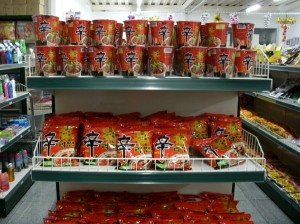DOH raises alert on toxic mugs, noodles

Certain mugs, along with six brands of Korean noodles, may sicken consumers, the Department of Health (DOH) on Wednesday said.
The DOH issued the warning after a nongovernmental organization found that some mugs being sold in Metro Manila contained lead.
The EcoWaste Coalition found out that 35 mugs sold in bargain shops in Mandaluyong City; Sta. Cruz, Manila; Alabang, Muntinlupa City; and Cubao, Quezon City, contained heavy metals. The mugs, which had Christmas designs painted on them, were each sold for P20 to P85.
All 35 samples were found to contain one or more heavy metals above levels of concern after these were screened on Oct. 31 with a handheld X-Ray Fluorescence chemicals analyzer, the group said.
The government earlier banned the sale of six Korean noodle brands after these were found to contain benzopyrene, which could cause cancer.
The Korean noodle brands are Nong Shim Neoguri Mild, Nong Shim Big Bowl Noodle Shrimp, Nong Shim SaengSaengUdon Bowl Noodles, Nong Shim SaengSaenUdon, Nong Shim Neoguri Hot and Nong Shim Neoguri Hot Multi.
“We are still examining the samples and we will wait for the results of their (benzopyrene) levels before we decide what action to take,” Health Secretary Enrique Ona said at a press conference.
“A temporary ban on the importation of the affected brands has been issued until such time that lab tests have proven that the levels are within acceptable limits and safe for consumption,” he added.
FDA tests
The Food and Drug Administration (FDA) was also conducting tests on the mugs and other Christmas products.
“They are being subjected to lab tests to validate if the lead pigments are there. Mugs are becoming convenient Christmas gifts. That becomes a potential hazard, so we are going to monitor them,”
FDA Director Kenneth Hartigan-Go said at a press conference.
Hartigan-Go said the public should avoid buying products without warning labels.
“Consumers should always ask where the products came from. If the paint is peeling off and the pigments are easily removed, then obviously they might become a hazard for young children,” he said.
The FDA chief also called on mall operators to monitor the products being sold by vendors inside their premises, especially after the agency discovered that some cosmetic products contained mercury.
“Some reputable malls apparently don’t do their due diligence to check the vendors. Vendors are selling cosmetics, whitening cosmetics that contain mercury,” Hartigan-Go said.
“It should not just be the vendors’ responsibility but also the mall that consigned the place to them to sell these products. We’re talking of big, reputable malls,” he added.
Out of the 35 sample mugs examined by the EcoWaste Coalition, 29 were found to contain lead above the 90 parts per million US limit for lead in paint. The 29 lead-tainted samples had an average of 12,643 ppm lead.
The coalition also discovered that nine ceramic Christmas decors—which bore the images of Frosty the Snowman, Santa Claus and a Yuletide tree—contained lead up to 16,400 ppm.
Four of the samples came from a retailer in Mega Q Mart in Quezon City, the EcoWaste Coalition said.
Safety of noodles
Ona said South Korean authorities had assured the DOH that they would ensure the safety of future stocks of the questioned noodle brands.
Hartigan-Go said the government had recalled 13 boxes and 124 pieces of the six noodle brands.
“We call on the public to report if they see these brands still being sold in stores. The levels of (benzopyrene) will have a bearing on the lifting of the ban,” he said.
“The DOH is in coordination with the Bureau of Customs and the Department of Trade and Industry on the matter and the matter will be resolved soon,” he added.
The DOH said the source of the benzopyrene was dried bonito powder. Based on the lab analysis made by South Korean authorities, the levels found in the six brands ranged from 0.4 to 1.6 ppb, “and almost no harmful effects on the human body.”
“But as a precautionary measure, recall of the products was done,” the DOH said in a statement.
“If (it’s) necessary to compare, smoking 10 cigarette sticks is equivalent to eating 60 bowls of the affected Korean noodle products,” it added.